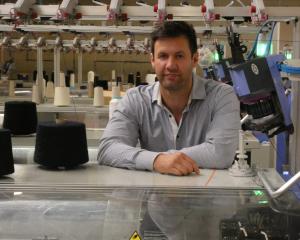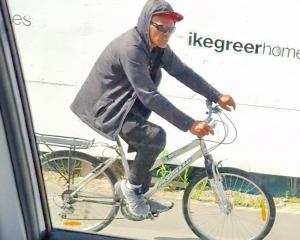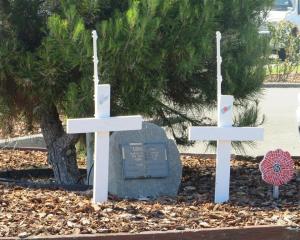
The battle for a South Island NRL team has seen plenty of casualties, but the fight goes on.
For three decades, several bids for a second New Zealand team in the world's premier rugby league competition have been repulsed.
But the scrap is now in the same city as the NRL plans to add an 18th men's franchise by 2028.
Most recently, the NRL declined bids from two South Island groups, though they vow they will continue their push, while another player has entered the race.
Significant capital, influential figures, infrastructure deals, rejections, rumours, rifts and resignations.
RNZ looks at the turbulent history of Kiwi NRL bids.
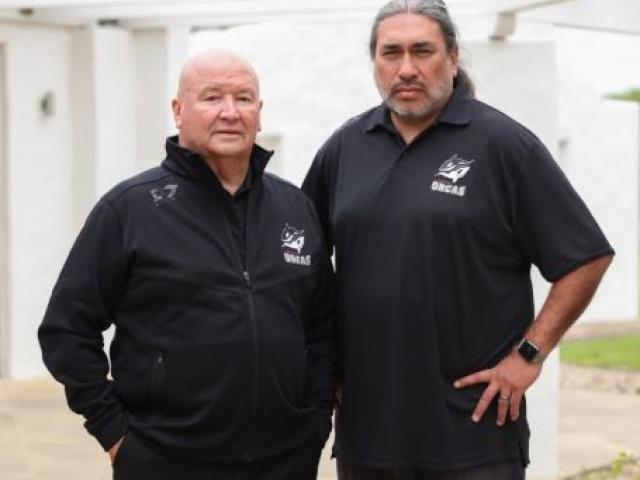 Sir Graham Lowe and Andrew Chalmers. Photo: Supplied
The Southern Orcas
Sir Graham Lowe and Andrew Chalmers. Photo: Supplied
The Southern Orcas

The backers: Sir Graham Lowe, Andrew Chalmers, Ed Farish, Michael Searle, Phil Bergman, Simon Doig.
Chairperson: Sir Graham Lowe.
Pushing for entry to the NRL from 2027, the Southern Orcas have launched a $360 million bid. The team is headed by Sir Graham Lowe and Andrew Chalmers, who believe other South Island bids cannot compete with the capital they have available.
"We expect that from day one, we will be challenging the best teams in the competition. Christchurch is a city that loves sport and loves winners," Sir Graham Lowe said.
"We're sure they will get behind the Orcas and that new stadium will be a cauldron of support where visiting teams will find it very hard to pick up a win."
Long road of rejections
This is not the first crack Chalmers has taken at bringing the NRL south of the Bombays.
The former chairman of New Zealand Rugby League has been in a 33-year ongoing battle to get a second Kiwi side in the NRL.
"I have been trying to get a second NRL operating in this country since 1991. I know I'm not everyone's cup of tea. I just have a very clear set of goals. It's something I am deeply committed to seeing through."
1991: The first of Chalmers' NRL bids came back in the early 90s as the NRL was looking to expand across the ditch. He was approached by Ken Laban and John Morrison to join a rival consortium against the bid from Auckland, proposing the Wellington Dolphins. The Warriors won the race to join the premiership in 1995.
2004: Now director of NZRL, Chalmers resurrected the notion for a Wellington NRL side with the establishment of the Wellington Orcas' bid in 2004. Despite a strong financial backing, the franchise ultimately went to the Gold Coast Titans who joined the NRL in 2007.
2007: The chairman of NZRL at the time, Chalmers sparks rumours of the Orcas potentially joining the Super League. An evaluation was carried out on the viability of a Kiwi side, however, without the support of the English clubs, nothing eventuates.
2021: Chalmers champions a new $30m bid for the Wellington Orcas to represent the lower North Island and South Island. However, upon presenting it, he was informed the NRL were set on Queensland expansion, and the licence was ultimately awarded to the Redcliffe Dolphins in 2021, with them entering the NRL in 2023.
2024, February: Another bid for the Orcas is launched, the team now planning to base itself in Christchurch. The Orcas are one of three South Island bids rejected in October.
2024, October: An upgraded $360m bid from the now Southern Orcas is officially launched including a high-performance centre and sports education trust.
"We are in the process of commercialising and operationalising the key elements. It is a significant undertaking, there are a lot of arms to this."
Bringing Bulls back from the brink
Chalmers has a colourful history with franchise management. After being asked by the RFL to assist in a restructure the Salford Devils in 2012, he was able to put together a proposition to rescue the club. He served as director for five years and in 2016 was again contacted by RFL to help the Bradford Bulls which had fallen into liquidation.
"Bradford was a difficult one, it was lumbered with the legacy of liquidations. It was all but dead but saving 150 years of history, that was compelling, and worth fighting for."
Chalmers came to a club which had lost several player contracts and been docked 12 competition points, a challenge too great to overcome and the side was relegated.
"It was always going to be a difficult proposition, but we thought we would do it, and we were able to gain promotion the next year, so in terms of the Bulls, it was successful from our perspective on field, we were able to resurrect that club."
However despite the wins on the pitch, historic financial woes still plagued the club, and with their home stadium costing them half a million pound per season, Chalmers opted to move the side from Odsal Stadium. The relocation to Dewsbury was met with fan backlash, though the club did become financially stronger as as result. New ownership in 2019 sold players to inject $350k into the club, with Chalmers stepping down from his position and taking a half million pound loss from his own pocket. The team has since returned to Odsel.
"That's the nature of a sports club, the new owners were happy to sell players and take consequences of the results of that on the field. It's not a popularity contest, rugby league is a collision game on and off the field."
Lessons Learnt
"What's absolutely certain is that you have to meet a whole multitude of requirements which will change across time and it's essential to make sure the political will within the Australian Rugby League exists. You need to present a compelling set of reasons. Having the capital, that's the easiest part, but I believe the political will is there and I am confident we will get this over the line."
 Frank Endacott. Photo: Getty Images
The South Island NRL bid
Frank Endacott. Photo: Getty Images
The South Island NRL bid

(Team name TBC)
The backers: Frank Endacott, Poto Williams, Colin Groves.
"I don't have any doubts that the NRL know that the South Island is the right place. That's why we are doing it, for the city, for our sport and to give young people the opportunity to make something of their lives here instead of worrying about going to Australia, they can stay with their families and play in the NRL," Frank Endacott said.
Though the group has not assigned a name for their proposed franchise, it has also been a turbulent time for the SINRLB.
Founding trio step down
The most recent rejection resulted in all three directors and founding members Kieran Bligh, Duane Fyfe and Tony Kidd, standing down from their positions as heads of the bid. Non-founding member Frank Endacott said despite the setback, they will soldier on.
"We will form a new company with a new name, unless we go in with one of the other two groups. We've had a pretty strong team, but it's just been decided by the three founding directors, to step down for their own reasons. I think a lot of that is disappointment with the rejection from the NRL, but we're going to continue on as a new group and become stronger, and hopefully gain the franchise at the end of it."
Though the franchise is yet to be named, Endacott said they plan to land on one soon.
"We're actually discussing a name right now that will be coming out in the very near future.
An amalgamation invitation
With two rival bids in the same city proposing the same thing, Endacott said they are open to amalgamation.
"We will be talking to both groups and and then form an opinion on on what we hear. But If you talk with all three bids, they all want the same result. a franchise here in Christchurch for the South Island. I personally can't see the bids coming together into one, but I can see two coming together, and that would make one very strong, and most probably favourite bid, to get the franchise here and in the South Island and of course, we could take their name."
He believes a joint venture would be a winning move.
"It just makes sense to have a strong bid, The end result is to get the franchise, and if it means joining together with one of the others, then so be it."
Endacott has met with the Orcas but wouldn't disclose the details of discussions. He said they will meet with the Kea next week.
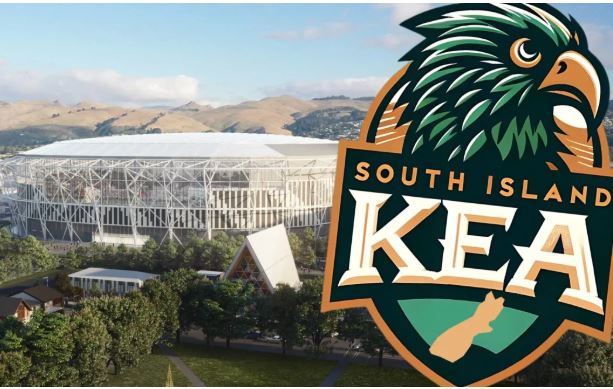 The new stadium and a proposed Keas logo. Photo: Christchurch City Council / South Island Kea
The South Island Kea
The new stadium and a proposed Keas logo. Photo: Christchurch City Council / South Island Kea
The South Island Kea

The backers: David Moffett, Andy Marinos, Michael Goldstein, Youssef Mourra, Tim Bateman, Rob Picone.
Chairperson: David Moffett.
"There's only one New Zealand team, so they take a lot of Kiwis over there to play in the competition. We think instead of going across that ditch, they should go across the shorter ditch, the Cook Strait, and come to Christchurch," David Moffett said.
New stadium, new side?
With confirmation of Te Kahu's construction, Moffett and his team began talks in March to make the Southern Kea a reality.
While Moffett was approached to be involved in the original consortium in Christchurch, he declined the offer and instead made a the bid for the Kea, targeting a 2028 debut in the NRL.
The Kea would also include a women's franchise competing in the NRLW competition and matches also played at other South Island venues including Dunedin's Forsyth Barr Stadium.
Flying under the radar
Despite the rejections and competing bids, Moffett said the Kea will continue to focus on their own bid and not be side-tracked.
The Kea have stated previously they will not work with Lowe and Chalmers. Moffett told Stuff that they would only entertain a joint bid with bids that reflect their own values and with that in mind there was absolutely no chance of combining with the Orcas bid.
The competition
It is not just the NRL powers at be the South Island bids are up against, but also political will.
Described as "soft diplomacy", Canberra is offering AU$600m over 10 years for a prospective club in Papua New Guinea, on the condition that the PNG government does not sign a security deal with China.
"We know they're there, but we're not looking at driving them out or beating them. We just want that third one," Endacott said.
Other regions vying for a spot include Western Australia, though a bid from the Western Bears, a joint bid by a Perth consortium and the North Sydney Bears, was also rejected in October. A fifth Queensland side has also been touted.



